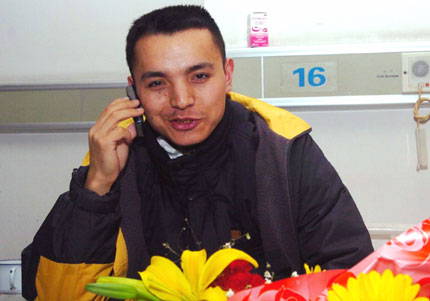Sick teacher's tale melts many hearts
By Huang Zhiling (China Daily)Updated: 2007-02-27 09:32
 Dou Hongbo makes a call to his students from his wardroom at No 2 Hospital Affiliated to Chongqing Medical College on February 25, 2007. He is doing fine. [Xinhua]  |
CHENGDU: None of Dou Hongbo's students were aware that their teacher suffered from anemia until he collapsed in the middle of a lecture on January 8.
The prognosis was not good. Dou's condition was so advanced that a kidney transplant was judged his only hope, but the costly procedure was more or less out of reach for someone living on the teacher's meagre salary.
That was when news of his condition started to spread, eventually inspiring a wave of kindness that reached its peak during the Spring Festival holiday, as local people flooded Dou's hospital room with flowers, fruits and food and what appears to be enough money to pay for his operation.
"I feel better than before Spring Festival and can walk now thanks to all the support from the public," said the 25-year-old teacher.
Dou teaches Chinese language, ethics and sports for fifth graders at Luqing Village Primary School in Pengshui Miao and Tujia Autonomous County. He also teaches sports to second, third and fourth graders.
"The school's students are poor. Mr Dou has given money to many students to help them pay for their expenses and workbooks," said Peng Weihong, a fourth-grader at the school.
"To save money, he doesn't eat breakfast and gives his lunch to poor students," said Peng, who had traveled for 10 hours along a mountain path to see her teacher before the lunar new year.
Several months ago, students noticed that Dou had started carrying a little brown bottle around with him. Whenever he coughed, he would have a drink from it. They assumed that the bottle contained some kind of soft drink. It was not until Dou fainted early last month did they find out that the bottle contained traditional Chinese medicine.
Zhong Ling, chief of the Department of Kidney-related Diseases at No 2 Hospital Affiliated to Chongqing Medical College in Southwest China's Chongqing Municipality, where Dou is being treated, said severe anemia had caused Dou's kidneys to fail and a transplant would be his biggest hope of survival.
But the operation, which costs hundreds of thousands of yuan, was out of Dou's reach. With a monthly salary of only 700 (about $90), he has to support a wife and seven-month-old daughter.
Luqing is a poor village more than 40 kilometers from the county seat. But that did not stop students from Peng's class from traveling a long distance to sell corn and eggs at the market to raise more than 1,000 yuan ($128) to help pay for Dou's medical fees.
"Mr Dou must have got sick because he works so hard. There are fewer than 10 teachers at the school, and more than 400 students. He had to teach more than 20 classes each week," Peng said.
Local media picked up the story of Dou's illness and his students' efforts to help their teacher, and the news touched the hearts of countless readers when it was published in the middle of this month.
On February 13, local media launched a fund-raising campaign in Chongqing. Anyone who wanted to contribute to the effort to help Dou could send a short message that cost 10 yuan ($1.3) via mobile phone.
The scale of the public response to the campaign came as something of a surprise. Within three days, donations from short message senders amounted to 400,000 yuan ($51,282), which was enough to cover Dou's medical expenses, according to Xie Gangjin, headmaster of Dou's school.
|
||
|
||
|
|